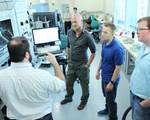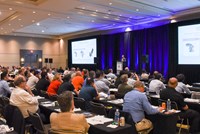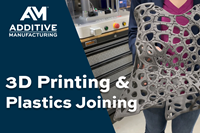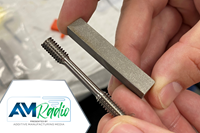Renishaw and Plastometrex Collaborate to Increase Precision, Efficiency of AM Mechanical Property Analysis
Plastometrex’s PLX-Benchtop facilitates rapid, direct testing on different sections of additively manufactured parts, delivering comprehensive stress-strain curves in minutes to provide a more precise evaluation of a part’s mechanical properties.
Plastometrex, a provider of advanced mechanical testing solutions, has supplied Renishaw, an additive manufacturing (AM) OEM, with enhanced mechanical testing capabilities. The collaboration focuses on incorporating Plastometrex’s Profilometry-based Indentation Plastometry (PIP) technology and results into Renishaw’s testing processes, thereby increasing the precision and efficiency of mechanical property analysis and part confidence in AM.
Tensile testing in the AM sector presents several challenges. First, the time and material required to produce tensile coupons take up significant chunks of project time lines and budgets, while the use of separately printed tensile coupons often fails to fully represent the mechanical properties of complex
AM parts, potentially affecting the reliability of data.
Renishaw’s adoption of Plastometrex’s PIP testing tackles these challenges. The PLX-Benchtop facilitates rapid, direct testing on different sections of AM parts, delivering comprehensive stress-strain curves in minutes. This method provides a more precise evaluation of a part's mechanical properties and complements Renishaw’s existing testing procedures.
By enabling users to directly test an AM part, and in several different locations, the PLX-Benchtop equips Renishaw with a significantly more detailed understanding of the mechanical properties of a part while streamlining the testing process. The test itself is largely automated, taking under five minutes and requiring minimal sample preparation. Furthermore, through bypassing the need for coupons and associated material and machining, Renishaw is set to benefit from mechanical testing cost and time savings.
“We can now use cubes built for product development for additional testing, saving us time and money,” says Benjamin Haigh, Renishaw materials scientist. “Additionally, the PLX-Benchtop can generate mechanical data for a wider range of parameters.”
“PIP technology is a fantastic complement to our existing mechanical testing regime,” says Jed Robinson-Wall, Materials Science graduate. “It gives us even greater insight into the quality of parts produced on our RenAM 500 series of metal additive manufacturing systems.”
The companies say this collaboration not only surmounts the traditional limitations of tensile testing but also sets a new standard for accuracy and efficiency in mechanical property analysis for AM.
Related Content
-
Nikon Acquires Avonix Imaging
Nikon aims to strengthen its X-ray digital inspection solutions by combining its rotating target X-ray sources and proven software with Axonix Imaging’s expertise in the design of configurable systems, controls and product handling.
-
Dimensionics Density Offers Automated Density Determination for AM-Produced Parts
Formnext 2023: Dimensionics Density’s automatic density determination technology provides automated, accurate and repeatable density determinations for additive manufacturing production.
-
Making Sense of Data from Directed Energy Deposition (DED)
“It should be easier to qualify an additive part than a casting,” says Formalloy CEO Melanie Lang. The company’s tools for capturing and analyzing data are bringing this vision closer to reality.
















